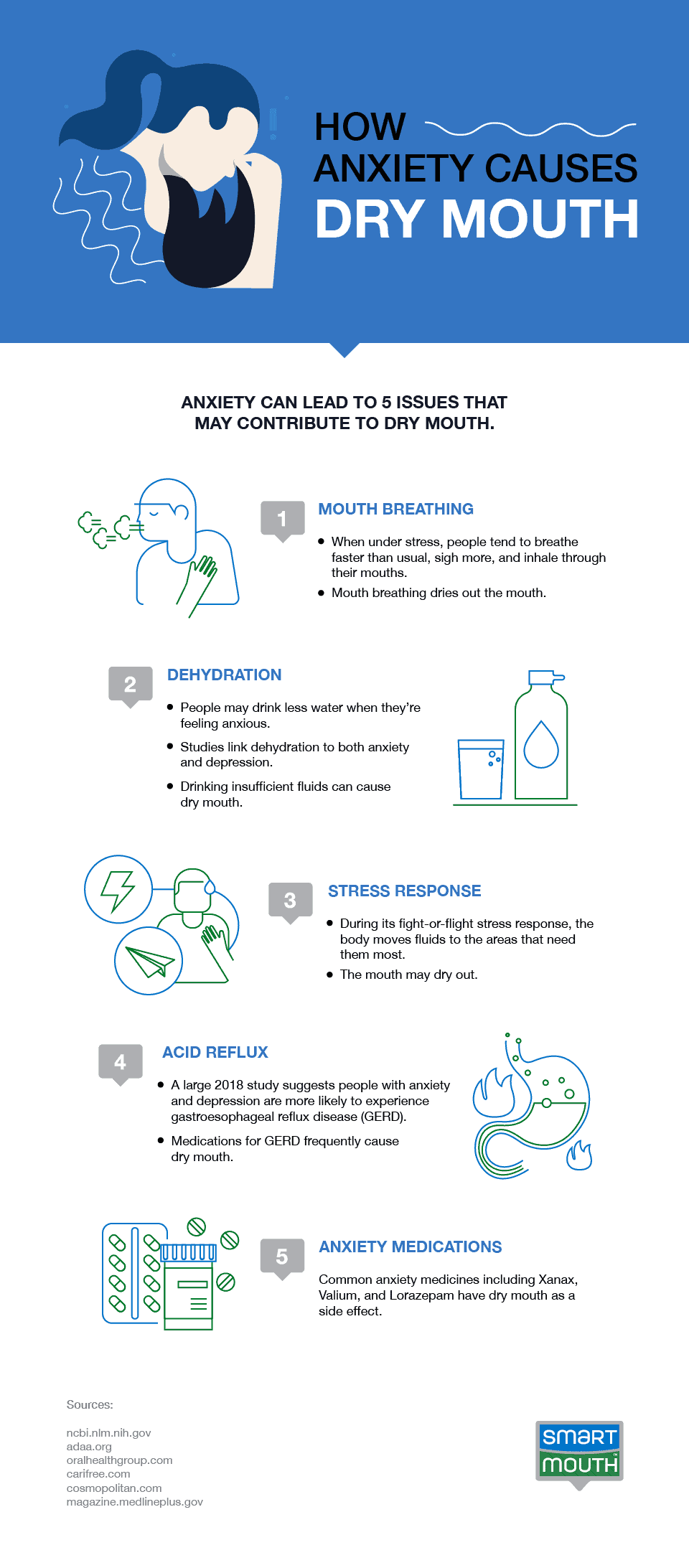What Causes Cottonmouth?
Cottonmouth or dry mouth may not sound like a big deal, but it can affect sufferers’ daily lives in several ways. For instance, it can make eating a challenge, increase the chances of poor oral health, and more. Keep reading to learn more about the importance of saliva and the reasons you may not have enough. Then discover some simple measures you can take to help keep your mouth hydrated.
Saliva Facts
Most people produce about 3 to 6.5 cups of saliva each day. It contains 99 percent water with the remaining 1 percent consisting of various electrolytes such as sodium, potassium, and calcium as well as organic components such as enzymes, proteins, and more.
Saliva typically doesn’t receive a lot of attention, but it plays an important role in keeping us healthy. It aids in tasting, chewing, and swallowing and helps promote proper nutrition and digestion. It even helps us when we talk.
Cottonmouth Side Effects
Saliva also plays a crucial part in promoting good oral health. A reduced amount of saliva can lead to gum disease as well as tooth decay and plaque buildup. Fungal infections such as thrush also become more common. Sores inside the mouth, on the tongue, and at the corners of the mouth or on the lips may occur as well. Finally, a dry mouth can cause bad breath and issues with dentures.
Causes of Cottonmouth
Also known as xerostomia, dry mouth affects a wide variety of people for different reasons. Due to limited data, it’s difficult to determine how many people suffer from it, but experts believe it is likely anywhere from 1 to 65 percent. In individuals with certain health conditions or undergoing specific medical treatments, the number could be nearly 100 percent.
Here are some of the most common causes of cottonmouth.
Medications
Many people wonder if they can get cottonmouth from prescriptions. The answer is potentially yes, depending on the medication. More than 400 prescription and over-the-counter drugs can contribute to dry mouth.
Some of the most common types of medications that can cause a reduction in saliva include certain blood pressure medications, diuretics, antihistamines, decongestants, muscle relaxants, antidepressants, and pain medicines. Even the ADHD medication Adderall can cause dry mouth. This side effect may be worse for people who take more than one prescription drug.
Cancer therapy
Treatment for cancer can also lead to dry mouth. Chemotherapy may bring on xerostomia, but it typically goes away after a patient finishes therapy and heals. On the other hand, radiotherapy, which may be a treatment for head or neck cancer, can cause permanent tissue damage leading to ongoing issues with cottonmouth. A stem-cell transplant and the use of radioactive iodine for certain thyroid cancers may also cause dry mouth.
Aging
Growing older increases the odds of suffering from cottonmouth. About three in 10 people experience it after age 65, and four in 10 experience it by the age of 80. But aging itself may not be the explanation. Medications cause dry mouth for some of these elderly individuals. And in others, it may be related to health conditions.
Certain medical conditions
The autoimmune disease Sjögren’s (show-grins) syndrome is a common cause of cottonmouth. This ailment can affect any organ or body system, but most often leads to dry mouth and dry eyes.
A range of other serious conditions may contribute to dry mouth. They include HIV infection/AIDS, hypertension, stroke, diabetes, hepatitis C infection, and lymphoma. More commonly, everyday issues such as allergies and the medication used to treat them cause cottonmouth. And even the hormonal changes during pregnancy or menopause can result in xerostomia.
In addition, injuries to the head and neck can cause nerve damage that may limit oral sensations and make people feel like they have dry mouth.
Anxiety
People take shallow breaths through the mouth in times of stress, and the incoming air can dry out the mouth. Medications for anxiety and/or depression can also have xerostomia as a side effect.
Lifestyle choices
Finally, lifestyle choices may contribute to dry mouth. Dehydration is a common cause that you can easily remedy by drinking more water. Tobacco and alcohol consumption, as well as too much caffeine or spicy foods, can also result in cottonmouth. In addition, marijuana in all its forms, from smoking and edibles to concentrates and more, can cause the issue.
Tips to Manage Dry Mouth
The good news is, you can take some general steps to combat cottonmouth.
- Limit caffeine, alcohol, and tobacco intake.
- Avoid foods that are salty, spicy, sticky or sugary.
- Stay hydrated by sipping water and sucking on ice chips.
- Chew sugar-free gum or suck on sugar-free candy.
- Use a humidifier nightly.
Given xerostomia can lead to many dental problems, you can also take actions to help keep the mouth and teeth as healthy as possible.
- Brush twice a day or more with toothpaste containing fluoride.
- Floss daily.
- Use a specifically designed mouthwash for dry mouth.
- Visit the dentist at least twice a year.
- Promptly take care of mouth infections or other issues.
- Apply lip lubricants every few hours as needed.
Conclusion
Cottonmouth is a common problem. The causes for it can range from prescription medication side effects to anxiety and lifestyle choices. While cottonmouth can disrupt daily living and impact oral health, you can take the above measures to improve your quality of life and reduce its impact.




